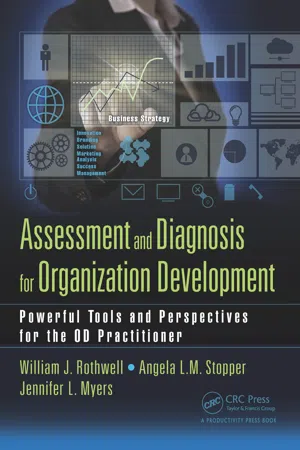
Assessment and Diagnosis for Organization Development
Powerful Tools and Perspectives for the OD Practitioner
- 192 pages
- English
- ePUB (mobile friendly)
- Available on iOS & Android
Assessment and Diagnosis for Organization Development
Powerful Tools and Perspectives for the OD Practitioner
About this book
Although the theory and methods of organization development (OD) assessment and diagnosis have been covered in other books, there is a lack of practitioner-focused guides that introduce real-world case studies and tools rooted in the methodology. This book will fill that gap, providing practical perspective and insight from practitioners and consultants currently practicing OD assessment and diagnosis. Organization Development (OD) differs from management consulting in that OD assessment and diagnosis is not a prescriptive consulting engagement. Instead, OD methods include engaging clients to build change leadership initiatives customized to their particular situation. OD is not about a consultant telling a client company what to do. It is about an OD professional guiding client companies on their journey towards the best end point for their particular situation. This book will address that journey. The theory and foundational principles of OD are covered, but the primary focus is on providing practical applications to businesses. While the book is grounded in sound academic theory, its strength is its practitioner-focused methodology containing vignettes and tools that individuals can use to help guide the assessment and diagnosis efforts in their own or their client organizations.
Tools to learn more effectively

Saving Books

Keyword Search

Annotating Text

Listen to it instead
Information
Chapter 1
Introduction and Overview of Diagnosis and Assessment for Organization Development
Contents
1.1 Introduction
- What is organizational assessment and organizational diagnosis?
- Who conducts organizational assessment and diagnosis?
- When is organizational assessment conducted?
- Where is organizational assessment conducted, and how does context affect the assessment process?
- Why is organizational assessment conducted?
- How is organizational assessment conducted?
1.2 What Is Organizational Assessment and Organizational Diagnosis?
1.3 Who Conducts Organizational Assessment and Diagnosis?
1.4 When Is Organizational Assessment Conducted?
- Organizational history
- Organizational mission
- Organization strategy
- Organizational structure
- The organization’s relationship to external groups such as industry, community, nation, suppliers, distributors, customers, unions, and other groups
- Organizational performance against targets
- Organizational performance against best practices
- Organizational performance against legal issues
- Organizational performance against common business practices
1.5 Where Is Organizational Assessment Conducted, and How Does Context Affect the Assessment Process?
Table of contents
- Cover
- Half Title
- Title Page
- Copyright Page
- Dedication Page
- Contents
- Preface
- Acknowledgments
- About the Editors
- About the Authors
- Advance Organizer
- Chapter 1 Introduction and Overview of Diagnosis and Assessment for Organization Development
- Chapter 2 Diagnosing and Assessing Organization Development Effectiveness
- Chapter 3 Diagnostic Models following Open Systems
- Chapter 4 Diagnostic Models Addressing Environmental Forces and Organizational Readiness
- Chapter 5 Planning for Assessment and Feedback for Organization Development
- Chapter 6 Collecting and Analyzing Data for Organization Development
- Chapter 7 Feeding Back Data and Action Planning for Organization Development
- Chapter 8 Challenges and Their Related Opportunities in Diagnosis and Assessment for Organization Development
- Chapter 9 Conclusion and Future Directions of Diagnosis and Assessment for Organization Development
- Index
Frequently asked questions
- Essential is ideal for learners and professionals who enjoy exploring a wide range of subjects. Access the Essential Library with 800,000+ trusted titles and best-sellers across business, personal growth, and the humanities. Includes unlimited reading time and Standard Read Aloud voice.
- Complete: Perfect for advanced learners and researchers needing full, unrestricted access. Unlock 1.4M+ books across hundreds of subjects, including academic and specialized titles. The Complete Plan also includes advanced features like Premium Read Aloud and Research Assistant.
Please note we cannot support devices running on iOS 13 and Android 7 or earlier. Learn more about using the app